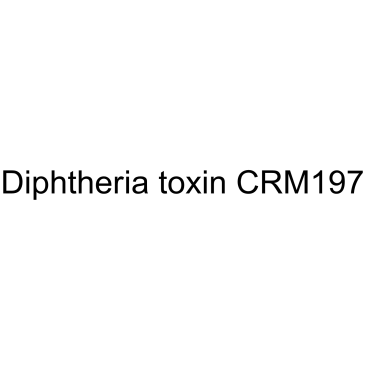Clinical experience of treatment of metastatic melanoma and solid tumours adopting a derivative of diphtheria toxin: cross-reacting material 197.
Giammaria Fiorentini, Roberto Banfi, Patrizia Dentico, Sabina Moriconi, Gina Turrisi, Filippo Pelagotti, Susanna Rossi, Francesco Montagnani
Index: In Vivo 27(2) , 197-202, (2013)
Full Text: HTML
Abstract
Diphtheria toxin (DT) has shown anticancer activity in both experimental models and humans but its adverse effects stopped further developments. Cross-reacting Material 197 (CRM197) is the product of a single missense mutation (Gly52 to Glu) within fragment A of DT. It has been shown to induce weak toxicity in some cell strains, but it shares immunological properties with native DT. CRM197 commonly acts as an immunological adjuvant, or as an inhibitor of heparin-binding epidermal growth factor. Recently, CRM197 was shown to have promising antitumor activity. To better-define this property, we planned a phase I-II study.Twenty-nine patients bearing advanced melanoma (18 cases), and other solid tumors (two ovarian cancer, two sarcoma, two gastrointestinal cancers, one urinary bladder carcinoma, one glioblastoma, one neuroblastoma, one ocular melanoma and one primitive neuroectodermal embriogenic tumor (PNET) were evaluated and 19 of them, sub-divided in cohorts, received the following levels of CRM197: Level 1, 0.3 mg; level 2, 1.0 mg; level 3, 2.5 mg; level 4, 3.5 mg; level 5, 5.0 mg; level 6, 7.5 mg. The drug was given once every two days for 4 times and then, after a 2-week rest period, once every 2 days for 4 times. CRM197 was administered subcutaneously in the abdominal wall.grade 1-2 common toxicities included fever, chills, fatigue, dizziness, nausea, vomiting and headache, neutrophilia and skin painful reactions appeared regularly at levels 3 and 4 (2.5 mg and 3.5 mg). Vomiting and abdominal pain, skin reaction tachycardia and hypotension appeared in two patients at level 5. At 7.5 mg, we observed a severe grade 3 reaction with hypotension, dyspnea and grade 4 myalgia. This was considered the dose-limiting toxicity. Eleven patients (seven with melanoma and four with other tumors) were treated to evaluate anticancer effects at the maximum tolerated dose (5 mg). Only one patient reported a minor response, lasting eight weeks. Ten patients reported progressive disease.CRM197, injected subcutaneously at 5 mg, elicited a generic inflammatory response causing toxicity, and did not exert a significant degree of antitumor activity in patients with advanced melanoma and solid tumour.
Related Compounds
| Structure | Name/CAS No. | Molecular Formula | Articles |
|---|---|---|---|
 |
Diphtheria toxin CRM197
CAS:92092-36-9 |
|
Carbohydrate-based vaccines with a glycolipid adjuvant for b...
2013-02-12 [Proc. Natl. Acad. Sci. U. S. A. 110(7) , 2517-22, (2013)] |
|
Glycoconjugate vaccines and immune interactions, and implica...
2011-11-01 [Expert Rev. Vaccines 10(11) , 1621-31, (2011)] |
|
Antitumor effects of CRM197, a specific inhibitor of HB-EGF,...
2011-07-01 [Anticancer Res. 31(7) , 2483-8, (2011)] |
|
Effect of increased CRM₁₉₇ carrier protein dose on meningoco...
2012-04-01 [Clin. Vaccine Immunol. 19(4) , 551-6, (2012)] |
|
Immunization with the conjugate vaccine Vi-CRM₁₉₇ against Sa...
2012-09-21 [Vaccine 30(43) , 6111-4, (2012)] |